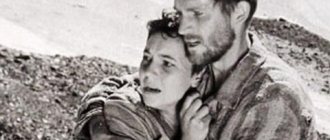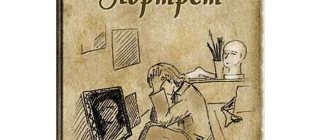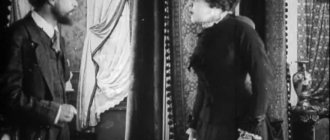Artistic Features
The story “The Sign of Byada” (original title) brought an award to its creator for a reason. The work became a significant milestone in the work of the Belarusian prose writer. The work played a significant role in the development of the literary process in the USSR.
Every line is imbued with the writer's style. The peculiarity of the author's work is to limit the spatial and temporal development of events. The number of main characters is also small, which allows you to quickly understand what the characters are like as individuals. Other features when considering the summary of “Sign of Trouble” include:
- The predominance of military themes with acute problems of the time.
- The fighting contrasts against the background of the psychological behavior of the central characters and runs like an invisible thread through them.
- Showing readers several verbal scenes telling stories about the characters' pasts, allowing them to understand how they came to live this way.
- Showing the war through the eyes of ordinary civilians, not combatants.
Experts unanimously claim that Bykov’s iconic story is the most anti-war work of the writer of all those presented earlier and later. The author's main task was to reveal to the reader the horrific consequences of the war and the atrocities of the fascist regime.
A bad sign, in short. Summary
A bad sign, in short. Summary
The apovest of the pachynaetz from the apisanny month, dze flock of khutar. It’s not enough to remember the former sit-down here. I on all the legs is a sign of good fortune, a sign of future troubles.
Scepanida, pasvyachy karova Babouk, ubachyla kalia rasboranaga masta nemtsa, yany loaded bervenne. Zhanchyna rushed to the house, and her husband stopped there. The Adramantavan bridge carried the threat of alienation to the khutars. Pyatrok and Scepanida are breathing parsyuchka. Pyatrok spadzyaetstsa, shto nejak abydzetstsa (“We are not guilty before them. And kali with them for the good, so we can, and yany... Don’t eat, we can... If you save yourself from hell, you need to take care of yourself as a magician and ISHEY..." ).
Ranitsay Scepanida drove at Pasha Babouka. Fives had no chance of working for the Gaspadars, since Guzh and Kalandzenak had passed away, the fingers. He senses the hell of the people, that the fingers have fallen on the streets, and in the villages, they are tired of the new regime. Guzh got a pack, but there was no bagatka and he gave me his bottle. Scepanida returned and did not touch her fingers. Knowing the woman's character, Pyatrok fears that the health is not right: The coupling of the razzlue Guzha and their arryshtuyts.
Guzh zakada hutka chakats іkh іх іх і мі м garelku, and yashche pavedamіts pra bandits, when they appear on the khutars.
As soon as you breathe out your fingers, Scepanida reprimands your husband for setting things up frequently. “Yana are always with guns, their control over people is weak, I can do everything. “But I wasn’t afraid of them, because I didn’t respect them,” says the author to the prajanchynu.
Just a few days later, the Germans showed up in the villages. The strangers were trying like gaspadars, but they weren’t torturing the people who lived here. The rich people were told to call and wash the house.
The officer arrived on Sunday. Praz neiki momentant sergeant major paklika Petraka. The officer pointed his fingers at the smoke of Stalin and the newspaper with which the hut was glued, and will give the postalet. Ale vystral yon not ў gaspadar hut, but ў zdymak.
Sepanidu gnatsa klopat, yak zastseragchy hellish Germans “karouku, parsyuchka, kurachak? I might not take any kind of bulb, but it’s time to start burning firewood... But what about in the winter? “Yana jumped into the car, when the Germans were on their way. Here the Yans earned money. The clutch hit the roof and fell. The sergeant-major made a wish to give Grandmother the cook. Open the padman, it hurts Scepanida. On the offensive, Zen Zhanchyna issued a malako to the pashas. That same sergeant-major shot Babouka.
“On her own day, Scepanida didn’t even think about killing herself in the cart - as much as she was in trouble for Babouka, she realized that something enormously large was collapsing and that a serious crisis was approaching and their school day was approaching. Zhanchyna brought the parsyuchka out of the garden and grabbed the boiled berries from the badger’s bunk. Dapamagu y nyamy Yanachka, yaki pasvіў vyaskovyh caroў. That night, Scepanida threw the gun into the kitchen, forgotten in the kitchen by the cooks (“Don’t think so; if we left, they can do everything”).
Because of the screws in the courtyard, the istoptsy, where the gaspads have been living, have all crossed over. The officer asked Petrak to work “klaset” and praised him for his work in the evening. Rejoiced Pyatrok rasshiy paprasitsya his violin, which, while drinking, should be taken out from the stove so as not to be consumed. Skrypku afitser adda, but before this gaspadar, a lot of gadzinas play, that the lord unraveled Scepanida.
Raptam's arrows were getting sick. The Germans killed Yanachka as she was jumping to the farm of Pravda Scepanidze.
Scepanida remembered that day when Patapka Kalandzyonak punished her for collecting the kambed. Most of the people are going through gatherings after gatherings, but people don’t want to register in Kalgas. Aposhni gathering sarva Guzh. Novik, the ancestor of the district committee, is the founder of “the dispossession of Guzhov Ivan, as a kulak feller and saboteur.” The forest of Guzha and all its berries are growing to the voices of hell. For the dispossession of kulak people from Kamsamo Vasil Gancharyk, no one will let Novik settle down. Scepanida and Lyavoy Bagatska galasavali suprats.
Five Russian kambeda do not praise: “- Kali uzho yes such daishla vocharadz, so what’s the budza? Why are you just a year or two budzetse dispossession?
- And then, maybe, not budze kago. All the kalgas are stepping down.
- Maybe I’ll step down. Ale yak zhas klasava barboy? Isn’t this cool barba hellish?”
At that Zen Pyatrok, being. Well, I’m glad I bought a violin, for which the clutch was welded until the end, because it was left without a boot.
The connection in my thoughts returned from my youth, when I only worked with Petrak and served as farm laborers for Mr. Yakhimousk. Happy spring day in memory, when the campaign to “exploit... the exploitation of the exploiter” appeared on the farms. Because Mr. Yakhimowski has raised two dozen lands, a cow and a small horse. The joy disappeared from the packages of Yakhimousk. The fives of Admov's claim are in the shaft, in the earth and in the gas chamber, and in the process of the Scepanida.
Just now, Mr. Yakhimouski hangs. Unfortunately before this, Pyatrok and Scepanida pavinilsya before the old manager of the house, he did not hold back against them, but said: “There will be no happiness on someone else’s and for free. I want you."
Viasnoy, watching over the hill, didn’t wash it out, and the little filly fell. Pyatrok and Scepanida dug up dozens of weeds, grazing chago Pyatrok dug on the pagorak and pastavii vyalik draulyany roofs, falling down, because he was “hell damned to the people and gods of the earth.” Nekhta from Viaskoўtsaў called this month Petrakova Galgofay. Ale hutka kryzhs were eaten by vyaskovy Kamsamolets.
In anticipation of the deportation of Guzh, people began to register in Kalgas. The connection was ў kamisiya na abagulvannі. The regional newspaper published a note that “at Slabadskie Vyselki they are fighting against the class of their enemy - the kulak.” The nicknames of the three gaspadars were called, which are “mind the mercenary force” - they were fed by arats, harvest, malatsits. Those who are respected from the region and surroundings are working on the dispossession of the “class enemies” revealed to the village correspondents. The chain of this terrible thing was destroyed and destroyed, and she began to growl at her respected people: “Isn’t justice required? It's too bad for the poor man! So why is it fair?.. Nelga, let’s do it! You've gone crazy out there, haven't you? Geta told all the people to bachats, and you...”
Scepanida moved to Polatsk, and there was justice there. Ale pas daroz za khutara ya perastraў son of the dispossessed Guzh, took the pennies, bread and made a wish for the ladies, the farmstead. We're coming from the forest Pyatrok, the dachshund's pit is from Zmitser Guzh, and we're going to pick up the canoe. Anyutka Ladymirava ran to the front and burst into tears. They spent the night in ўpaўnavazhanaga. Andrei and Antsip, Anyutka’s brother, the police barked, Guzh utsek. Scepanida realized that the captain was no longer right, she realized what a buzz was going on in the sapling, how the pot was running away from the meat.
This is Ladymira, the dacha of Anyutka, who is a policeman, Kamsamol resident Vasil Gancharyk. Dispossessed, exiled the bride, he was shot in his own house, in the vacancies of the three-bastard brother Yanka. Cotton has been ill since that hour.
“I've been watching all this night since the beginning of the 19th century. The flabby, tanky whole padlet, sunburned on the chests of the Kashlians, lay on the floor of the lak.”
The Germans left the hut. And then the fingers appeared, forcing Petrak to put his foot on the road. Watch at work Guzh pakinu Patap Kalandzyonka. For the entire day he did not allow the old men to rush or break up. “What a bastard!” - I think Pyatrok. - Why did you not breathe a little? The Geats are sorry for Guzh. 3 tym, although it’s possible, it’s not a good idea, but the gety will grab you for the rifle.”
Pyatrok replaces the violin with a snake and replaces the moonshine still. On the farms, Guzh, Kalandzenak, Nedaseka appeared in the villages. “Agentura” said that they were asking for an old violin. I don’t know Petrak, Guzh pakinu on the farms of Nedaseku chakats yago.
I'm going to give it a miss because of my brother, Novik. Servants of the Germans, like yon Gavary, ratava in the very hell of the famine shastsera dzyatsey. Scepanida thought to herself that such people are not taught, because in the future they will not be punished. “Such a blind hell of nature and a small glimpse of the eternal life that only exists in the world.”
Five add two bottles of moonshine to Nedasek. Just now Kalandzenak appears - Guzh patrabava yashche dve. The rich thing will give you the same idea, understandably, this moment, which is not great - you won’t buy it, you won’t enjoy it. That night, unknown fingers appeared. The chattering harelki, they crossed the hut, the grave, they killed Scepanida, and Petrak, the pastavis of the scyans, they burned with arrows.
“This night fell to the executions of noshta destroyed ў Petrakova svyadomastsi, neshta nepapraўna evil, beat hadu yago dumak sa zveklaga for yago stake, yon don’t know what the slave is and where to go...”. With an insufficient bottle of pershaka, it comes out of the woods, when you go to the villages. There I was already respected and he would throw the bottle into the bushes. The fives are no longer afraid of them, they only hope that Hutchey has already passed away, and died here, in her backyard. But the old man, his hands tied, fell on the faithful and the myastechka - he himself is suing from the village of Pyatrok against the admov. “He knows that he is from the world, just as he is from the whole world, just as he is from the whole world.”
There were two companions in Petrak... Three people came to the village. As the Gaspadars and certain bosses understood. The investigation of pra zhytstse, pra parades in Kalgas began. Scepanida showed everything that she was upset, Petrak was already ashamed of the little woman. The elders, with all their strength, give tens of rubles from kisheni and give Scepanidze - for malaco and medicine for sick people. Zbyantezhanaya Scepanida tried to get a nickname, which one will give. Vaiskovets, as he left the house, glanced briefly and said: “Tavarysh Charvyakov.”
Charvyak ruined gaspadar on the developed life of a rich life, nicknamed Iago, Bagatska, he already knows.
And in the summer, Pyatrok recovered from Minsk and Charvyakova. Aryshtavali for the “radzіtselstvo” of Kalgasnag elder Lyavon. The coupling, not to do justice to the meat, not to the area, decided to go to Minsk and the elders of the urad. Ale herself was not a muggle, she was nag.
Five days of the Hadzi Kalya Houses of Urada, not powerful and rashytstsa go there, sleep, maybe sustrene Charvyakova Kalya Budynka. Near the hellish beast, test it with the policeman. The policeman said that Charvyakov died. At home Pyatrok abnadzeiu Scepanida, that is a sheet with signatures and in pennies I give to the elders. The little woman both believed and did not believe, because Lyavon, while shepherding the aryshta, was not sure. In Scepanida chula, as fingers crossed over their husbands. Ёй В was velmі kepsk, motsna baleў right side galava. Thoughts swirled about why Petrak was taken, why he didn’t know. Zhanchyna adchula, shto yana “perazhyla her forest. As if I didn’t live on this, the gods settled the world. Everything was collected, all the bastards were drinking, putting it on the pastry... They turned the adnasal, put together the kalektyvyzatsy, and thought: let's burn the pasta. Already after five years of escape, they fought with their famous enemies - all in troubles, troubles, troubles and sleeplessness... Scepanida realized that her war would no longer fall in force.” | At night there was a shepherd in the door, I called him, but I didn’t open the door, the pasture plowed, because the geta was not suitable for the fingers. Ranitsay yana paishla da Karnily. I'm dying to say that there was no one to save the unexploded bomb. Then they decided with Petrak that it would not have happened here without Karnila, like a coffin and everything else. Scepanida bought the bomb for a parsyuchka. Then I came to my senses, and suddenly I knew everything about Petrak’s great father. Vartavy, and geta byu Nedaseka, turnuu janchynu ad turemnay frame. Kalya kamendatury Scepanida ugledzela nastavnika Svyantkovskag, as would be the case with the German translators. Toy, asseragayuchy, and know the transfer for Petrak and the workshop, insisted on the hat, as soon as I immediately went to hell.
In the evening, Karnila brought a bomb and they buried it in the ditch. Scepanida had the idea of somehow trying to seize the bridge, although it was so admissible, because the one who killed with her, with Petrak, with the khutaram, was not a muggle.
As soon as the day began to fall, Scepanida fell asleep and fell asleep. Yana knew that her brother’s son had returned from the camp. He would have been a kamanjiram and could have given the bombai. Pa daroz sustrela Guzha i Kalandzyonka, yakiya.vyali aryshtavanaga Karnilu. Yana rushed to the hut and, straining, grabbed the bomb. The same day has passed. The dog, who was shepherding the death of Yanachka, fished and Bagatska, papyeredzіў with his brahams Scepanida, and yana paspel ўskochyts ўіstok, put a hand on the right hand. The fingers of the Magli would shoot their own vehicles, but the Scepanida was alive for them.
The coupling gave a pasudzina from the gas - adzinae that Pyatrok brought, the Kali Vyaskovians dismantled the edge - and fell on the doors, on the surface, and fell. The doors stopped moving. Zhanchyna explained that there, at the rauku, I don’t care about anyone from the bombai, “for nothing, the pain was wasted and the power was wasted, which I was relying on.”
Editions of the work
In 1987, the Moscow publishing house “Soviet Writer” published a series of novels and stories by Russian authors. The created anthology was called “Beyond the Line of Mercy. Live and remember. A sign of trouble." In total, the publication contained 656 pages. The work became serial for a reason, because the story is about the cruelty of war times, self-sacrifice, and the lack of mercy among those in power.
In 2004, the capital Russian publishing house Eksmo created a series of literature called “The Red Book of Russian Prose.” The author was given a separate collection, which included a sensational work about the war and other works. In total, the serial edition contains 928 pages with design and artistic layouts by Bondarenko.
Signs of War (Essay based on the story “Sign of Trouble” by V. Bykov)
The theme of the Great Patriotic War became for many years one of the main themes of literature of the 20th century. There are many reasons for this. This is the enduring awareness of the irreparable losses that the war brought, and the severity of moral conflicts that are possible only in an extreme situation, and the fact that for a long time every truthful word about modernity was expelled from Soviet literature - the theme of war sometimes remained the only island of authenticity in a stream of far-fetched, false prose, where all conflicts, according to instructions from above, were supposed to reflect the struggle of the good with the best. But the truth about the war did not come through easily; something prevented it from being told to the end. Today it is clear that it is impossible to understand the events of those years, human characters, if we do not take into account that 1941 was preceded by the terrible 1929 year of the “great turning point”, when the liquidation of the “kulaks as a class” was not noticed, how all the best in the peasantry was liquidated, and 1937 year... One of the first attempts to tell the truth about the war was the story of the Belarusian writer V. Bykov “Sign of Trouble”, which became a milestone in his work. The story was preceded by his works about the war, which have already become classics of 20th-century literature: “Obelisk”, “Sotnikov”, “Until Dawn” and others. After “Sign of Trouble,” Bykov’s work takes on a new breath and deepens into historicism, primarily in such works as “Vtumane” and “Roundup.”
B is a man at war. A person does not always go to war; sometimes war itself comes to his house, as happened with two Belarusian old men, peasants Stepanida and Petrok Bogatko. The farm where they live is occupied. The police come to the estate, followed by the Germans. They are not shown by V. Bykov as intentionally committing atrocities, they simply come to someone else’s house and settle down there as masters, following the idea of their Fuhrer that anyone who is not an Aryan is not a person, complete destruction can be caused in his house, and the inhabitants of the house themselves be treated as work animals. And that is why it is so unexpected for them that Stepanida is not ready to obey them unquestioningly.
Not allowing yourself to be humiliated is the source of this middle-aged woman’s resistance in such a dramatic situation. Stepanida is a strong character. Human dignity is the main thing that drives her actions. “During her difficult life, she nevertheless learned the truth and, little by little, gained her human dignity. And the one who once felt like a human will never become a beast again,” writes V. Bykov about his heroine. At the same time, the writer does not just draw this character to us, he reflects on its origins.
It is necessary to think about the meaning of the title of the story - “Sign of Trouble.” This is a quote from a poem by A. Tvardovsky, written in 1945: “Before the war, as if as a sign of trouble...” What was happening even before the war in the village became the “sign of trouble” that V. Bykov writes about.
Stepanida Bogatko, who “for six years, without sparing herself, worked hard as a farm laborer,” believed in a new life and was one of the first to enroll in a collective farm—it’s not for nothing that they call her a rural activist. But she soon realized that the truth that she was looking for and waiting for was not in this new life. When they demand new dispossession, fearing suspicion of pandering to the class enemy, it is she, Stepanida, who hurls angry words at an unfamiliar man in a black leather jacket: “Isn’t justice needed? Don’t you smart people see what’s going on?”
More than once Stepanida tries to intervene in the course of the case, to intercede for Levon, who was arrested on a false denunciation, and to send Petrok to Minsk with a petition to the chairman of the Central Election Commission himself. And every time her resistance to untruth runs into a blank wall. Unable to change the situation alone, Stepanida finds an opportunity to preserve herself, her inner sense of justice, to move away from what is happening around: “Do what you want. But without me."
In the pre-war years - the source of Stepanida’s character, and not in the fact that she was a collective farmer activist, but in the fact that she managed not to succumb to the general rapture of deception, words about a new life, fear, she managed to follow herself, her innate sense of truth and preserve the human element within you. And during the war years it determined her behavior. At the end of the story, Stepanida dies, but she dies without accepting her fate and resists it to the last.
One of the critics noted ironically that “the damage Stepanida inflicted on the enemy army was great.” Yes, the visible material damage is not great. But something else is infinitely important: Stepanida, with her death, proves that she is a human being, and not a working beast who can be subjugated, humiliated, and forced to submit. Resistance to violence reveals the strength of character of the heroine, which, as it were, refutes death, shows the reader how much a person can do, even if he is alone, even if he is in a hopeless situation.
Next to Stepanida, Petrok is shown as a character, if not the opposite of her, then at least completely different, not active, but rather timid and peaceful, ready to compromise. Petrok's endless patience is based on the deep conviction that you can talk kindly to people. And only at the end of the story, this peaceful man, having exhausted his entire reserve of patience, decides to protest, openly resist. Violence drove him to rebellion. An unusual, extreme situation awakens such depths of soul in this person.
The folk tragedy shown in V. Bykov’s story “Sign of Trouble” reveals the origins of genuine human characters.
The main characters of the story
It is not necessary to read the entire story to understand that the central characters are simple, hard-working people living in a secluded place during wartime. So far they don’t even know the echoes of the fighting, but soon trouble comes to their lands. The events that took place characterize each central image in vivid colors:
- Stepanida is the mistress of the house, where the Germans burst in with their orders. A respectable and hardworking woman who is constantly involved in housework - grazing livestock, feeding birds and animals, gardening, etc. A merciful peasant woman feels compassion for the local deaf-mute shepherd guy and takes care of him. A strong, courageous, courageous and unbending Belarusian woman. She deceives the Germans, for which they give the whole family a serious beating. The woman is constantly nostalgic about the past and does not want to accept the imposed regime. Her house is taken away by the German invaders, and the Bogatka family is made their slaves. In the end, the heroine's nerves can't stand it. Filled with hatred, a woman sacrifices herself in protest.
- Petrok is the husband of Stepanida. A weak-willed and submissive person, unable to defend the honor of his family or protect his own home. He takes care of the household and skillfully helps his wife hide the animals from the Germans, but this does not help. He is not able to fight back even the police. He tries to complain about the foreigners to the sergeant major, but realizes that it is in vain. Worried about his wife. When she is wounded after a severe beating, Petrok hurries into the forest to find his treasury of moonshine in order to treat the wounds. The police take the find from him. The enraged man loses his balance and curses Gouge, for which he is beaten and thrown into prison.
- Yanka is a village boy, an orphan, unable to speak or hear since the age of three. He is engaged in herding cows. He has no money or clothes. Later, the young man helps hide Stepanida’s piglet. At the end of Chapter 11, the guy is killed.
- Kolondenok and Guzh are policemen who arrive at Bogatka’s house to report that their home will soon be occupied by a high-ranking German commander. They are constantly rioting, beating people. It was Guzh who took the moonshine from Petrok.
Also in the story, the author sometimes describes the German invaders, demonstrating the behavior of pseudo-heroes. At some points in the plot you can see a description of local residents who are below the poverty line.
Popular retellings today
- The truth - a summary of Shukshin's story
There was an inter-district meeting among the chairmen of collective farms and directors of state farms. One of the chairmen, Aksyonich, made a very bright speech, and even he himself did not expect such agility from himself. He listed all the shortcomings - Fluff - summary of Skrebitsky's story
The hedgehog, whose name was Fluff, was completely tame. He knew how to press the thorns to his back when someone stroked him. That's why he got that nickname. - The Wise Old Man - a summary of the fairy tale
The fairy tale “The Wise Old Man” tells of an ancient time when there lived one evil padishah who did not see the benefit of people over 70 years old and ordered his viziers to execute all the old people. - The Blue Cup - a summary of Gaidar’s story
The story of A.P. Gaidar “The Blue Cup” was written a long time ago, back in 1936. But after reading it, you understand that it will always be relevant. The work touches on the theme of family values.
“Sign of Trouble”, V. V. Bykov: analysis of the work
Stepanida died, she died, but the enemies failed to break her spirit, humiliate her, or defeat her. A buried bomb will cause them fear as it can explode at any time.
The author shows that even the weak-willed and submissive Petrok in the end also cannot withstand the bullying and begins to rebel.
Bykov spoke about the difficult fate of an elderly married couple. Readers feel very sorry for them. But they were able to live with dignity. A simple Belarusian woman showed miracles of courage. She personifies the image of peasant heroines who made a great contribution to the victory over the invaders! Everlasting memory.







